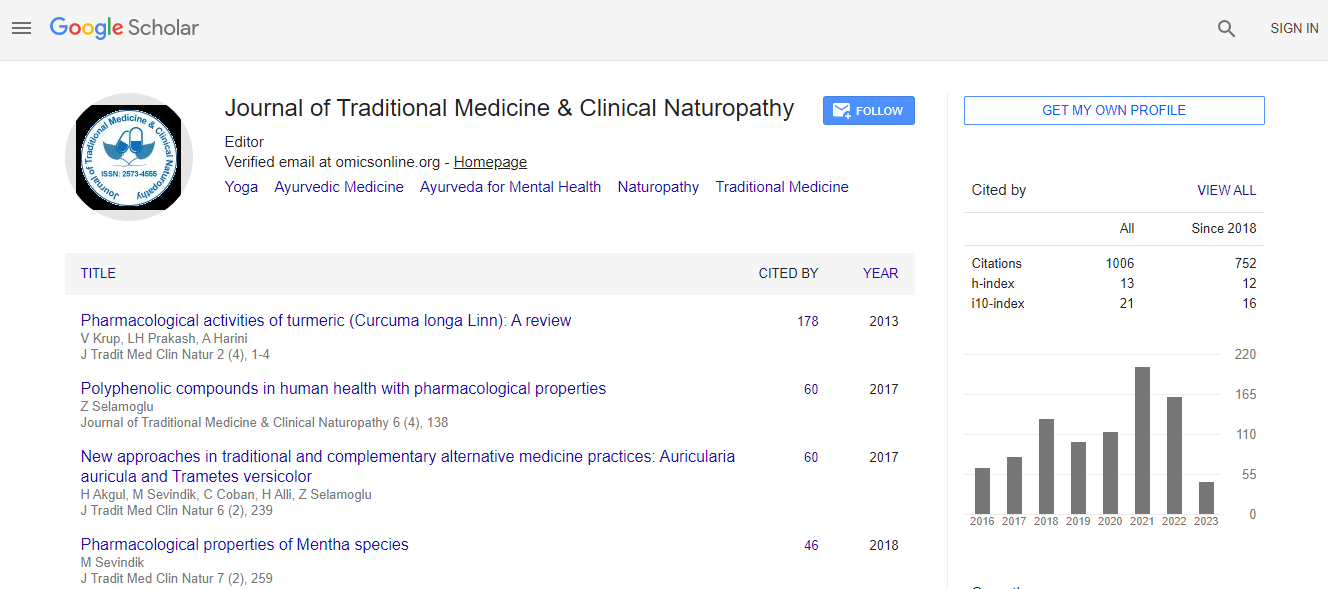Our Group organises 3000+ Global Conferenceseries Events every year across USA, Europe & Asia with support from 1000 more scientific Societies and Publishes 700+ Open Access Journals which contains over 50000 eminent personalities, reputed scientists as editorial board members.
Open Access Journals gaining more Readers and Citations
700 Journals and 15,000,000 Readers Each Journal is getting 25,000+ Readers
Google Scholar citation report
Citations : 1504
Journal of Traditional Medicine & Clinical Naturopathy peer review process verified at publons
Indexed In
- CAS Source Index (CASSI)
- Google Scholar
- Sherpa Romeo
- Open J Gate
- Genamics JournalSeek
- RefSeek
- Directory of Research Journal Indexing (DRJI)
- Hamdard University
- EBSCO A-Z
- Publons
- Geneva Foundation for Medical Education and Research
- Euro Pub
- ICMJE
Useful Links
Recommended Journals
Related Subjects
Share This Page
Acupuncture coupled with Chinese herbs in a perimenopausal patient with insomnia
8th International Conference and Exhibition on Traditional & Alternative Medicine
Hsiu-Ting Huang, Hang-Chen Hsu and Jung-Chih Lin
Chung Shan Medical University Hospital, Taiwan
Posters & Accepted Abstracts: J Tradit Med Clin Natur
Abstract
Insomnia, a common complaint, can be caused by underlying diseases, functional disorders, psychological distress or certain medications. While taking pills may be helpful, there has been some concern about potential side effects. Insomnia was a phenomenon of chaos and disharmony in the human body based on Traditional Chinese Medicine (TCM) principles and its pattern identification could be divided into 10 types. The 49-year-old female outpatient presented with a 3-month history of insomnia, abdominal distension, constipation and gastric discomfort after meals. Symptoms in addition to the complaints aforementioned included hot flashes, increased anxiety and chest distress. Based on her symptoms and signs, the TCM patterns of her insomnia were both Liver-qi stagnation transforming into fire and hyperactivity of fire due to yin deficiency. Consequently, we conducted acupuncture and herbal therapy dependent on the points of TCM. Several acupoints, including Yánglíngquán (GB34), Yīnlíngquán (SP9) and Sānyīnjiāo (SP6) were chosen for acupuncture treatment and we properly mixed equal amount of Chinese herbal powder, comprising Yi Gan San, Nu Ke Bai Zi Ren Wan, Shao Yao Gan Cao Tang, Guey Jy, Mu Li, and Long Gu as herbal therapy. Treatment efficacy was assessed by her self-report measures of Pittsburg Sleep Quality Index and quality of life in which her symptoms showed obvious improvement. According to this case, the combined treatment modality can alleviate menopause symptoms and reduce the frequency of insomnia. As a result, acupuncture and Chinese herbal medicine may be appropriate and effective for treating insomnia in perimenopausal women.Biography
Hsiu-Ting Huang has graduated from China Medical University in Taiwan with her Bachelor’s degree of Medicine and currently works as a Resident in Department of Integrated Chinese and Western Medicine at Chung Shan Medical University Hospital in Taiwan. Her specialist field is in internal medicine and she is dedicated towards integration of Chinese medicine and Western medicine to treat the health and well-being of patients.
E-mail: u9823601@cmu.edu.tw

 Spanish
Spanish  Chinese
Chinese  Russian
Russian  German
German  French
French  Japanese
Japanese  Portuguese
Portuguese  Hindi
Hindi 
